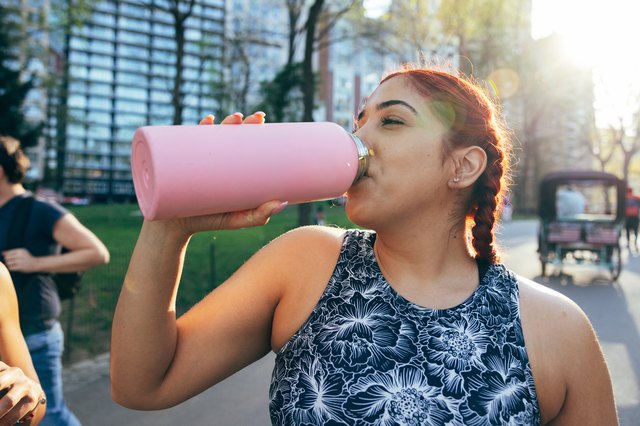If there’s one thing we all seem to be into these days, it’s electrolyte supplements. My favorite trainer on YouTube is forever sipping on a raspberry- or lemonade-flavored electrolyte drink during her workout videos, and countless social media videos sing their praises.
We know it’s important to stay hydrated, especially if you’re exercising regularly. And some of these add-ins are really tasty. But can you drink electrolytes every day — and should you?
To answer that, we spoke to a sports dietitian and two doctors with expertise in this area for their take on the benefits and risks of an electrolyte habit.
What Are Electrolytes, Exactly?
There’s a lot of buzz about electrolytes, but let’s back up for a second to define what we’re talking about.
“Electrolytes are various essential minerals that are found in our sweat, urine and bloodstream, and they help regulate the functioning of our vital organ systems,” says Erik Blutinger, MD, board-certified emergency medicine physician at Mount Sinai Queens and assistant professor of emergency medicine at the Icahn School of Medicine.
Electrolytes get their name because they carry an electric charge, per the National Library of Medicine. The most common are:
- Sodium
- Potassium
- Calcium
- Magnesium
- Chloride
- Phosphorus
But the most important electrolyte is sodium, because your sodium levels determine your blood volume, which affects every part of your body, says board-certified nephrologist David Goldfarb, MD, clinical chief in the Division of Nephrology at NYU Langone Health and a professor of medicine at the NYU Grossman School of Medicine.
You lose electrolytes when you sweat, so exercising or being in a hot environment can deplete your stores. And while water doesn’t contain electrolytes, these minerals are found abundantly in food. A cup low-fat cottage cheese, for example, has about one-third of the recommended daily amount of sodium, while the same amount of sweet potato has about one-quarter of the daily amount of potassium recommended for women and about one-fifth of the amount recommended for men.
Can You Drink Electrolytes Every Day?
The short answer is that drinking electrolyte supplements every day (or very often) likely isn’t going to do you any harm. But at the same time, it’s probably unnecessary.
“We eat electrolytes every day in our food. So yes, it’s fine to take them as supplements, but why spend your money on that when you can have a banana or a potato or an orange?” says registered dietitian Nancy Clark, RD, CSSD, author of Nancy Clark’s Sports Nutrition Guidebook and a board-certified specialist in sports dietetics who has a private practice in the Boston area.
It’s true you lose electrolytes like sodium and potassium during exercise, especially if it’s a long bout of strenuous activity in hot weather, Clark says, but here’s the thing: “The more you exercise, the hungrier you get, the more you eat,” she says, which naturally helps you replenish electrolytes via food.
“The body talks to you, and it will let you know if you need sodium” because you’ll crave salt. If that’s the case, she suggests sprinkling salt over a baked potato, sipping on chicken noodle soup or whipping up a box of mac and cheese. And if you know you’re going to do a lot of hard exercise one day, shore up your sodium stores by putting some extra salt into your oatmeal in the morning.
While electrolyte supplements offer nutrients in isolation, food is the complete package, Clark says, offering protein, carbs and fat to fuel your body more holistically. That’s why “chocolate milk is a far more nourishing and better choice than some commercial sports drink,” she says.
“For the average individual who eats a balanced diet and is generally healthy, electrolyte supplementation is not necessarily needed because the body has a really good auto-regulatory system already in place,” Dr. Blutinger says.
But these supplements could come in handy if you’re at high risk of electrolyte imbalances, he notes, like if you’re in extreme heat for long periods of time, performing hours-long rigorous workouts or you’ve done a lot of heavy sweating. Still, make sure to get your doctor’s OK first before taking any new supplement, as they may be dangerous for people with certain medical conditions.
Can You Take Too Many Electrolytes?
Anything is possible, but overdoing it on electrolytes is actually pretty hard to do, according to all three experts we spoke with.
“The kidneys regulate the amount of electrolytes in the body,” Dr. Goldfarb explains. “If your kidney function is normal, whatever amount of sodium, magnesium or other electrolyte you eat, you’re going to pee out the extra.”
If you have any problems with your kidney function, then it may be possible for minerals to build up in your body and cause certain symptoms of too much electrolytes, Dr. Goldfarb says. Hyperkalemia, for example, occurs when there’s too much potassium in the blood, and it can cause muscle weakness, numbness, tingling and nausea. In extreme cases, it can lead to chest pain, heart palpitations and shortness of breath, and it can be life-threatening, although this is unusual.
It may also be possible to go overboard on electrolytes like potassium if you’re taking medications that affect your electrolyte levels, Dr. Goldfarb says, such as those for diabetes or high blood pressure. If that’s you, ask your doctor before taking any kind of supplement.
What to Look for in an Electrolyte Supplement
If you want to take an electrolyte supplement and your doctor has signed off on the idea, there are a few things to look for in a safe and effective product.
The FDA only loosely regulates dietary supplements like electrolyte drinks and powders. The top supplement brands get their products third-party tested by the likes of USP or NSF to ensure they contain what they claim, in the amounts claimed, without potentially harmful additives like heavy metals. Look for a third-party seal on the product’s label.
Make sure to read the ingredient label on the product, as many electrolyte supplements contain vitamins as well. If you’re already taking a multivitamin or other vitamin supplement, take note of how much you’re getting and remember that these nutrients come through food, too.
And look for a supplement that contains some — but not too much — sugar, Dr. Goldfarb says. “People are worried about their calories, but it’s not there for energy,” he notes. Rather, sugar helps your body better absorb electrolytes, especially sodium. Still, you want to ideally limit your added sugar intake to less than 6 percent of your total daily calories, according to the American Heart Association.
“Eating should be for enjoyment,” Clark says, and that includes electrolyte drinks, if you’re taking them. So experiment until you find one that tastes good to you.
If you’re a generally healthy adult, taking electrolytes every day isn’t harmful, but you’re likely paying extra for nutrients you’re already getting through the foods you eat. If you like taking these supplements, go for it, so long as you’re choosing a high-quality product. But consider eating your electrolytes instead, via a diverse range of fruits, vegetables and other whole foods that come with additional nutritional benefits.
Read the full article here


